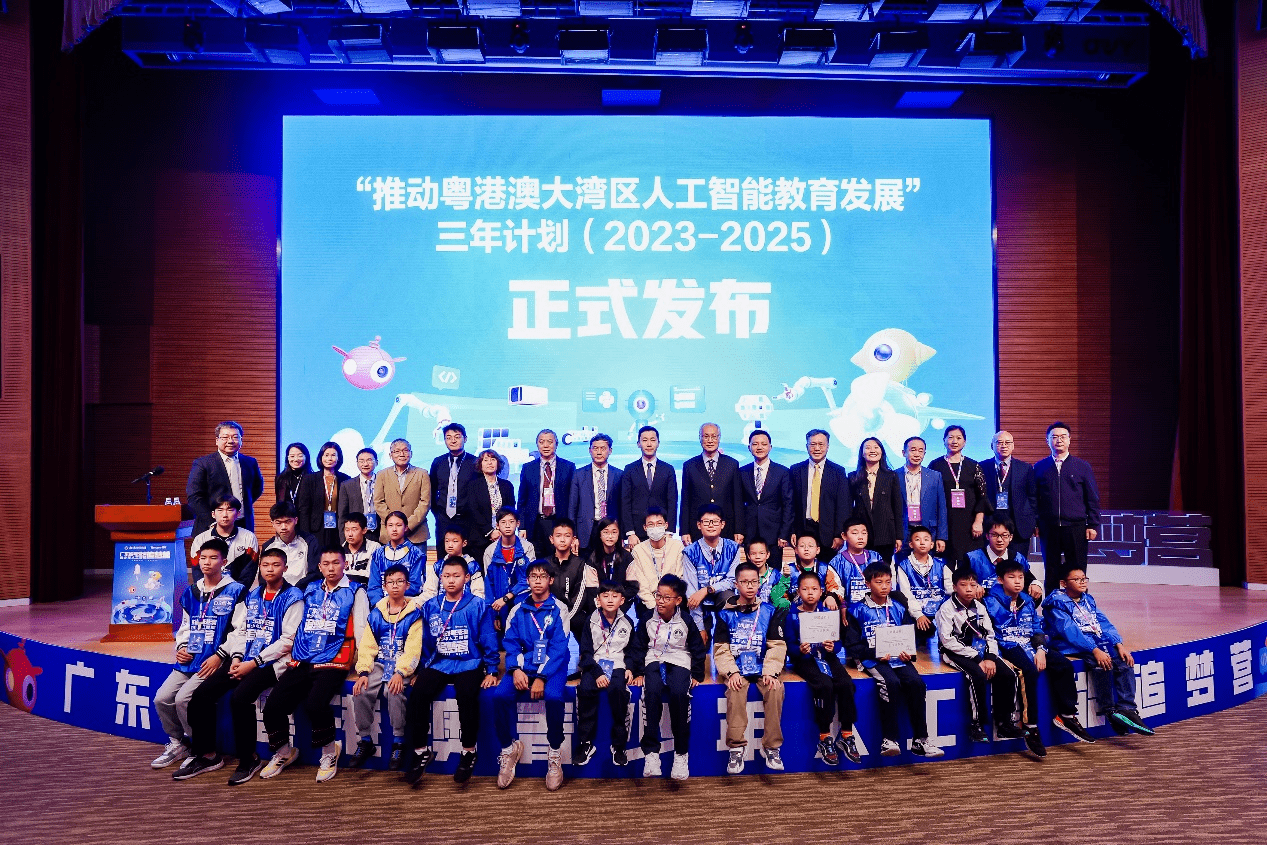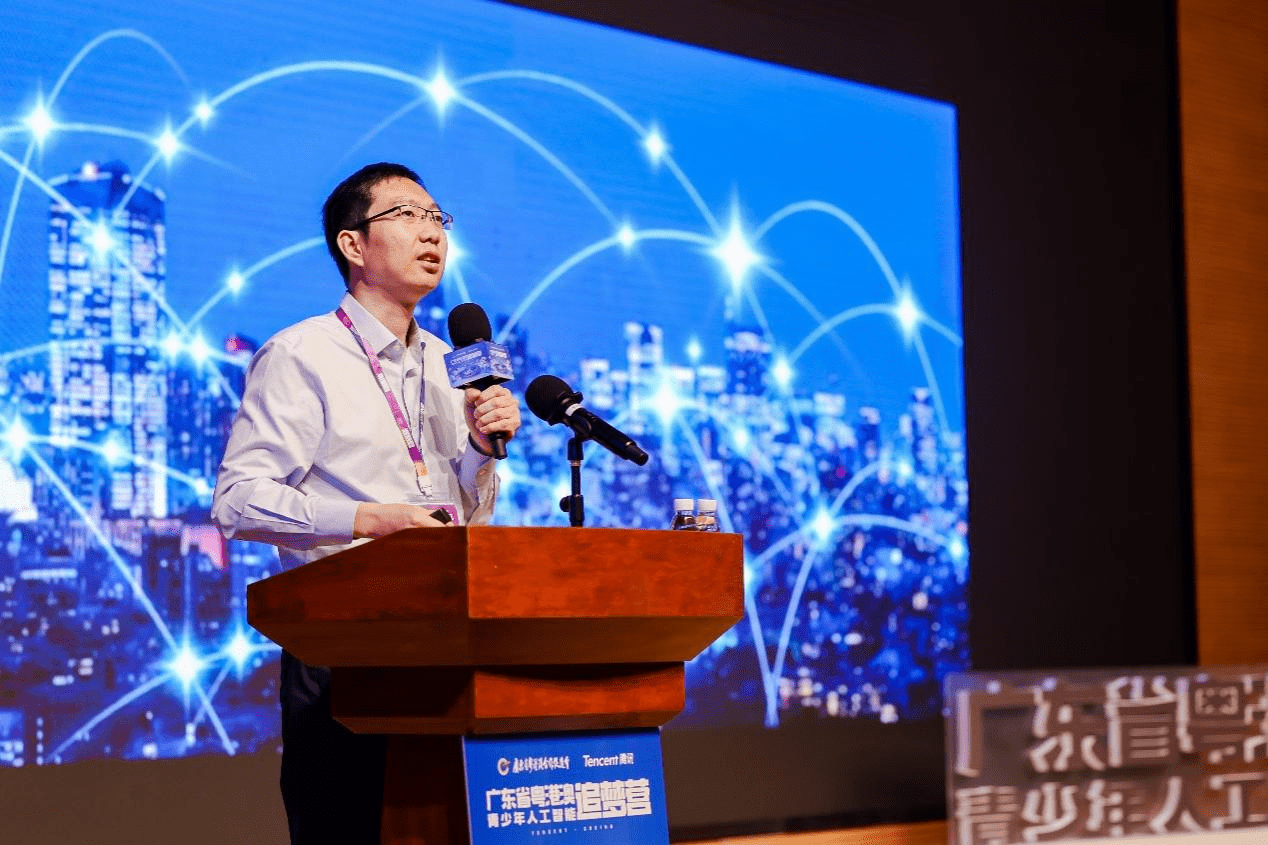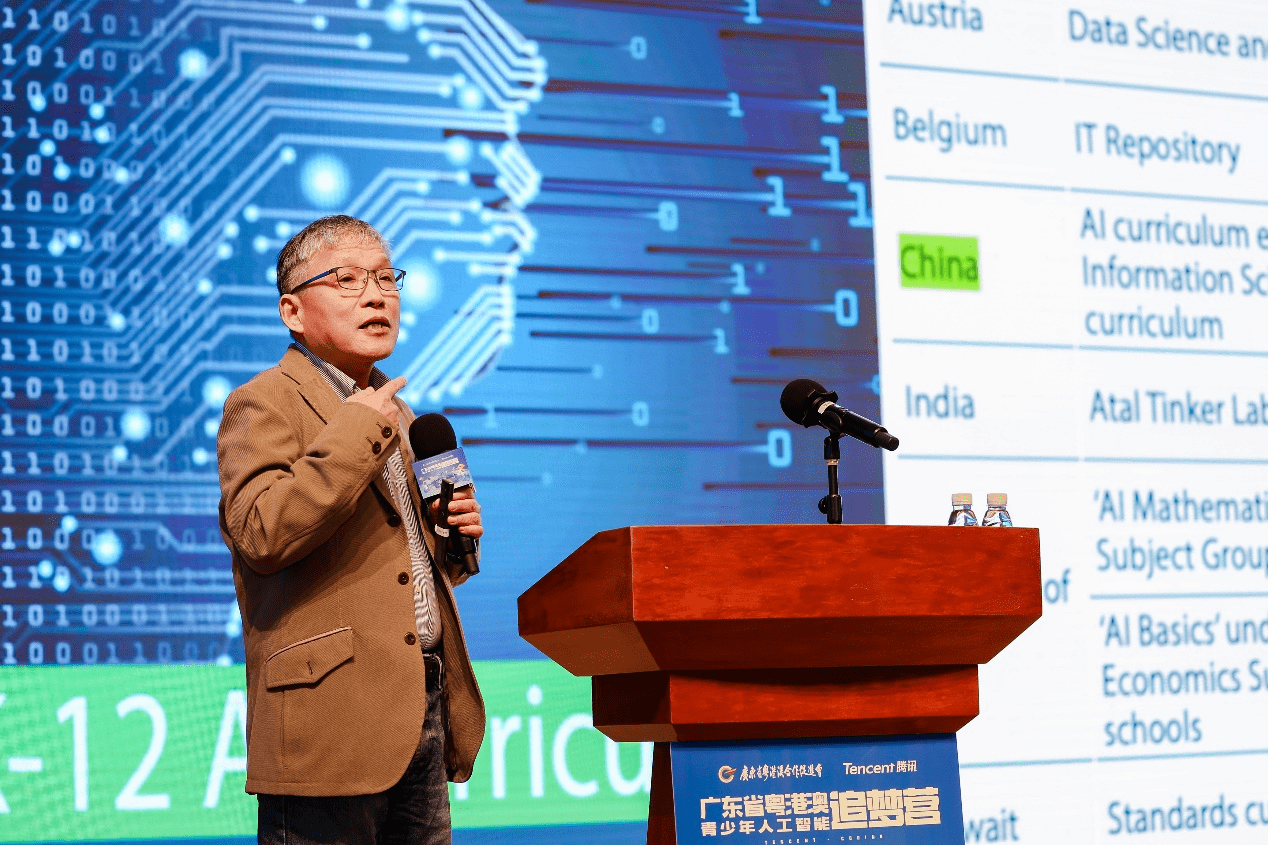 Technology peripherals
Technology peripherals
 AI
AI
 Digital technology serves education: Game technology helps popularize and implement artificial intelligence education
Digital technology serves education: Game technology helps popularize and implement artificial intelligence education
Digital technology serves education: Game technology helps popularize and implement artificial intelligence education
Recently, the Carnival Shenzhen, a provincial-level science and technology exchange event in Guangdong Province, "Guangdong Province Guangdong, Hong Kong and Macao Youth Artificial Intelligence Dream Chasing Camp" concluded. The event was hosted by the Guangdong Provincial Association for the Promotion of Guangdong-Hong Kong-Macao Cooperation and hosted by Tencent to create a window for exchange and interaction among young people in the Guangdong-Hong Kong-Macao Greater Bay Area, aiming to promote the collaborative cultivation of talents in the Bay Area. At the Greater Bay Area Youth Artificial Intelligence Education High-Quality Development Forum held concurrently with the event, many guests from the education sector had in-depth exchanges on hot issues such as the cutting-edge progress, development paradigms, and practical applications of artificial intelligence in education, scientific research, industry, and other fields. discussion.

The content that needs to be rewritten is: (Pictures provided by the school and released by CCTV)
On-site Cao Peijie, deputy director of the Institute of Digital Education of the Chinese Academy of Educational Sciences, pointed out: "In the past, talent training focused on the ability to read, write, and calculate. In the era of information technology, we must focus on cultivating the ability to question, guide, and human-machine collaboration. In the future Talents should have the literacy and ability to understand artificial intelligence, use artificial intelligence, and make good use of human-machine collaboration to complete a certain task."

The content that Cao Peijie needs to rewrite is: (Pictures provided by the school and released by CCTV)
With the rapid development of artificial intelligence technology in the context of the digital age, talent training and development direction are facing new requirements, showing more emphasis on data science and machine learning, cross-border cooperation and comprehensive thinking, practical and project experience, and innovation Characteristics of spirit and the ability to continuously learn and adapt.
Xiong Zhang, leader of the Compulsory Information Technology Curriculum Standards Group of the Ministry of Education, shared the theme of "The Layout, Changes and New Situations of Artificial Intelligence Education". The value of artificial intelligence education is becoming more and more prominent. It can not only cultivate students' innovative thinking ability and improve information literacy, but also promote cross-integration between different disciplines and broaden students' knowledge fields. Through artificial intelligence education, students can master the basic knowledge and technologies related to artificial intelligence and prepare for future employment. Now, artificial intelligence education has been included in the training standards of the new compulsory education curriculum and has become an important learning content in my country’s information technology courses

The content that Xiong Zhang needs to rewrite is: (Pictures provided by the school and released by CCTV)
In his speech, Cao Peijie mentioned three aspects that need to be paid attention to in artificial intelligence education. The implementation of artificial intelligence education needs to focus on solid advancement from the inside out, including teacher capacity reserves and rapid adjustment of course content according to new curriculum standards. Artificial intelligence teaching is a subject that pays great attention to practice. It is impossible for young people to fully understand data science, software programming, algorithm design, machine theory and other knowledge through one-way classroom teaching alone. Therefore, it is necessary to enable young people to better cultivate their interest in learning through practical teaching. However, to carry out sufficient practical teaching, there are extremely high requirements for hardware equipment. The procurement of high-standard equipment such as various Internet of Things equipment, sensors and digital acquisition platforms has also brought new challenges to the popularization of artificial intelligence education. In order to deal with this situation, Cao Peijie further pointed out that it is necessary to promote the transformation of artificial intelligence learning models, the reconstruction of courses and the innovation of teaching scenarios through the rational application of digital technology
Guangzhou successfully completed the popularization of artificial intelligence teaching in 1,600 primary and secondary schools by introducing the digital teaching tool Tencent Kouding·Virtual Simulation Laboratory. This digital teaching tool uses digital technology to create digital teaching scenes, provides effective teaching methods for artificial intelligence education, successfully gets rid of the limitations of hardware costs, and successfully carries out artificial intelligence courses. This achievement has also been rated as one of Guangzhou's top ten people's livelihood issues in 2023. It is reported that the self-developed engine "Dreamweaver" of this teaching tool can highly restore the various hardware modules and operating processes of the robot, creating a highly immersive and interactive digital learning scene. At the same time, through game technologies such as high-precision real-time rendering and high-simulation physical law simulation, physical processes such as gravity, collision and friction can be fully restored, allowing children to truly feel the impact of physical factors on robot assembly and operation in online learning scenarios. Impact. In this digital scene, young students can combine theory and practice and fully understand the impact of physical interactions on robot assembly and operation, thus saving the school a lot of hardware procurement and maintenance costs
Not only schools in Guangzhou, Tencent Kouding has used the programming learning and exchange activity "Guangdong Province, Guangdong, Hong Kong and Macao Youth Artificial Intelligence Dream Camp" to go to 300 regions across the country, including Cangyuan, Ji'an, etc., allowing more Teachers and students in many underdeveloped areas also have the opportunity to carry out artificial intelligence education
In the process of assisting the high-quality development of artificial intelligence education, the power of digital technology has always been indispensable. Digital teaching tools, represented by Tencent's QD Virtual Simulation Laboratory, break the physical limitations of teaching scenes through the clever application of game technology. Through the extension of digital scenes, they reduce hardware cost issues related to artificial intelligence teaching and also bring benefits to artificial intelligence education. More interactive forms and diverse content will broaden ideas for the popularization of artificial intelligence education.
(Note: This article belongs to the education industry information published by CCTV. The content of the article does not represent the views of this website and is for reference only.)
The above is the detailed content of Digital technology serves education: Game technology helps popularize and implement artificial intelligence education. For more information, please follow other related articles on the PHP Chinese website!

Hot AI Tools

Undresser.AI Undress
AI-powered app for creating realistic nude photos

AI Clothes Remover
Online AI tool for removing clothes from photos.

Undress AI Tool
Undress images for free

Clothoff.io
AI clothes remover

Video Face Swap
Swap faces in any video effortlessly with our completely free AI face swap tool!

Hot Article

Hot Tools

Notepad++7.3.1
Easy-to-use and free code editor

SublimeText3 Chinese version
Chinese version, very easy to use

Zend Studio 13.0.1
Powerful PHP integrated development environment

Dreamweaver CS6
Visual web development tools

SublimeText3 Mac version
God-level code editing software (SublimeText3)

Hot Topics
 1386
1386
 52
52
 I Tried Vibe Coding with Cursor AI and It's Amazing!
Mar 20, 2025 pm 03:34 PM
I Tried Vibe Coding with Cursor AI and It's Amazing!
Mar 20, 2025 pm 03:34 PM
Vibe coding is reshaping the world of software development by letting us create applications using natural language instead of endless lines of code. Inspired by visionaries like Andrej Karpathy, this innovative approach lets dev
 Top 5 GenAI Launches of February 2025: GPT-4.5, Grok-3 & More!
Mar 22, 2025 am 10:58 AM
Top 5 GenAI Launches of February 2025: GPT-4.5, Grok-3 & More!
Mar 22, 2025 am 10:58 AM
February 2025 has been yet another game-changing month for generative AI, bringing us some of the most anticipated model upgrades and groundbreaking new features. From xAI’s Grok 3 and Anthropic’s Claude 3.7 Sonnet, to OpenAI’s G
 How to Use YOLO v12 for Object Detection?
Mar 22, 2025 am 11:07 AM
How to Use YOLO v12 for Object Detection?
Mar 22, 2025 am 11:07 AM
YOLO (You Only Look Once) has been a leading real-time object detection framework, with each iteration improving upon the previous versions. The latest version YOLO v12 introduces advancements that significantly enhance accuracy
 Best AI Art Generators (Free & Paid) for Creative Projects
Apr 02, 2025 pm 06:10 PM
Best AI Art Generators (Free & Paid) for Creative Projects
Apr 02, 2025 pm 06:10 PM
The article reviews top AI art generators, discussing their features, suitability for creative projects, and value. It highlights Midjourney as the best value for professionals and recommends DALL-E 2 for high-quality, customizable art.
 Is ChatGPT 4 O available?
Mar 28, 2025 pm 05:29 PM
Is ChatGPT 4 O available?
Mar 28, 2025 pm 05:29 PM
ChatGPT 4 is currently available and widely used, demonstrating significant improvements in understanding context and generating coherent responses compared to its predecessors like ChatGPT 3.5. Future developments may include more personalized interactions and real-time data processing capabilities, further enhancing its potential for various applications.
 Best AI Chatbots Compared (ChatGPT, Gemini, Claude & More)
Apr 02, 2025 pm 06:09 PM
Best AI Chatbots Compared (ChatGPT, Gemini, Claude & More)
Apr 02, 2025 pm 06:09 PM
The article compares top AI chatbots like ChatGPT, Gemini, and Claude, focusing on their unique features, customization options, and performance in natural language processing and reliability.
 How to Use Mistral OCR for Your Next RAG Model
Mar 21, 2025 am 11:11 AM
How to Use Mistral OCR for Your Next RAG Model
Mar 21, 2025 am 11:11 AM
Mistral OCR: Revolutionizing Retrieval-Augmented Generation with Multimodal Document Understanding Retrieval-Augmented Generation (RAG) systems have significantly advanced AI capabilities, enabling access to vast data stores for more informed respons
 Top AI Writing Assistants to Boost Your Content Creation
Apr 02, 2025 pm 06:11 PM
Top AI Writing Assistants to Boost Your Content Creation
Apr 02, 2025 pm 06:11 PM
The article discusses top AI writing assistants like Grammarly, Jasper, Copy.ai, Writesonic, and Rytr, focusing on their unique features for content creation. It argues that Jasper excels in SEO optimization, while AI tools help maintain tone consist



